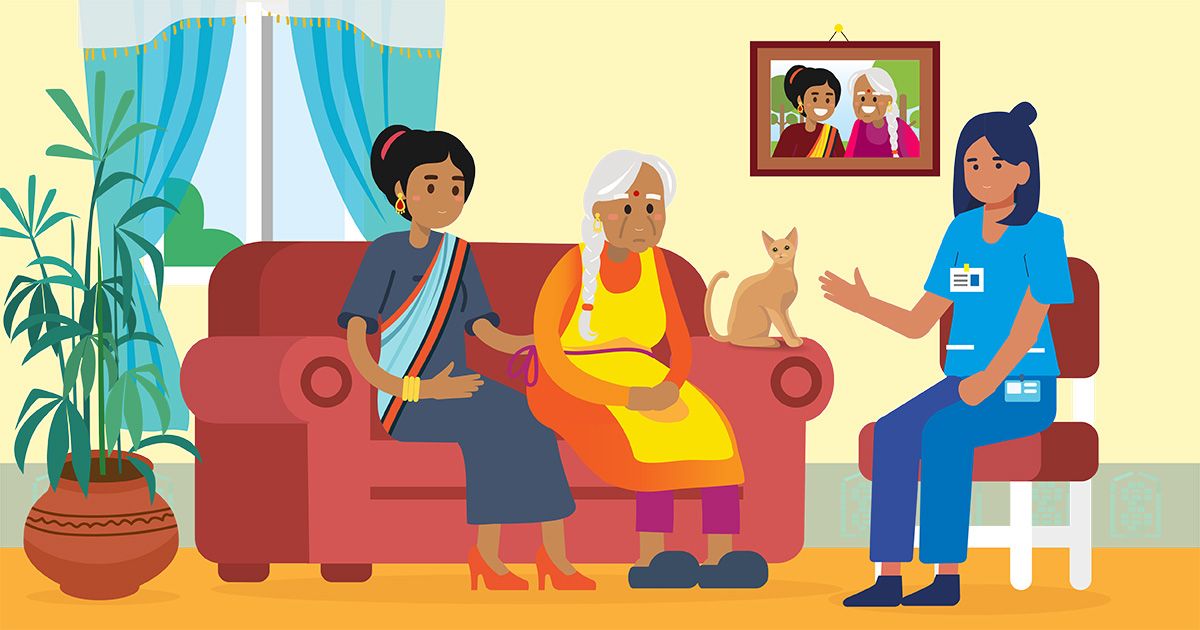We are continuing to strengthen our services to improve the quality of life for patients and their families who are dealing with life-limiting illnesses. The priority of Palliative and End of Life Care is to focus on what an individual and their family need as they approach the end of the person’s life.

This is not just about physical care but also about the emotional, social, and spiritual challenges that they may need to deal with. Everyone is different and delivering effective care will involve many different people.
Palliative and End of Life Care is delivered in the community and is arranged with the patient’s own GP practice alongside Community and Specialist Palliative Care teams. These teams also work in partnership with other health and social care professionals within primary care, hospitals, local hospices as well as volunteers and charities across Lincolnshire.
Some of these are local (such as St Barnabas, the Butterfly Hospice, St Andrews Hospice, Thorpe Hall, and the Spalding Hospice foundation) and some support is national (such as Marie Curie and MacMillan Cancer Support).
We have spoken to patients and families to understand their experiences and what we could improve. Whilst there is a lot of appreciation for the care that people have received, they have also told us that, sometimes, dealing with all these different teams can be frustrating, complicated and it can be difficult to understand how they fit together.
We are therefore working to improve the way that these dedicated teams come together and co-ordinate what they do to provide timely support for people at the end of their life. We are also making sure that, wherever they are in Lincolnshire, every individual will have access to the same type and quality of personal care and support.
We have identified that many people only get support when they are reaching the very end of their lives - but there are many benefits if we recognise and respond to palliative needs earlier in the person’s life. We are therefore focusing on earlier identification, advance planning, and co-ordination of care for all people who we know would benefit from palliative care and support.
Wherever possible we want to be able to provide care where an individual wants it to be provided. We also want individuals to be able to die in a place where they would like to do so. For most people, but not at all, this is at home -and we want to increase the services we provide in that place of care to make this possible.
ReSPECT – Planning Together
ReSPECT stands for Recommended Summary Plan for Emergency Care and Treatment. It is a conversation, process and a form. ReSPECT creates a personalised recommendation for your clinical care in emergency situations when you may not be able to make decisions or express your wishes and preferences.
The ReSPECT process consists of conversations between you and your healthcare professionals. These conversations produce recommendations about the type of care and treatment you would or would not like to be considered in the event of an emergency. The ReSPECT form is completed when these recommendations have been discussed. The form helps to provide a summary of your discussions, with personalised recommendations to ensure you will receive the most appropriate treatment for your individual situation. This plan stays with you, with the conversation noted and a copy saved in your electronic medical records. The ReSPECT process can be for anyone but has increasing relevance for people with complex health needs, people who are nearing the end of their lives and people whose health is at risk from sudden deterioration. You can record your care and treatment preferences for other reasons. The ReSPECT conversation enables an informed discussion to take place about your treatment and care preferences in an emergency, the form provides a record of this. In an emergency it can enable health care professionals make quick decisions about how to help you best.
For more information about ReSPECT, information for patients and families please see below including a specimen of the ReSPECT form and watch Joe’s ReSPECT journey through the ReSPECT process. Additional guides and accessible versions including Easy Read and alternative languages are available via the ReSPECT form webpage. Additional information and guidance are available for professionals and the public on the ReSPECT webpage via the Resus Council UK website. If you have any questions about ReSPECT, speak to a member of your healthcare team.
- ReSPECT and You: Planning Together, Information for patients, families of patients and members of the public
- ReSPECT form specimen
Joe’s ReSPECT Journey
To get more information about the services available - along with more detailed advice and guidance about dealing with palliative and end of life matters - please go to the Lincolnshire End of Life website: www.eolc.co.uk.


